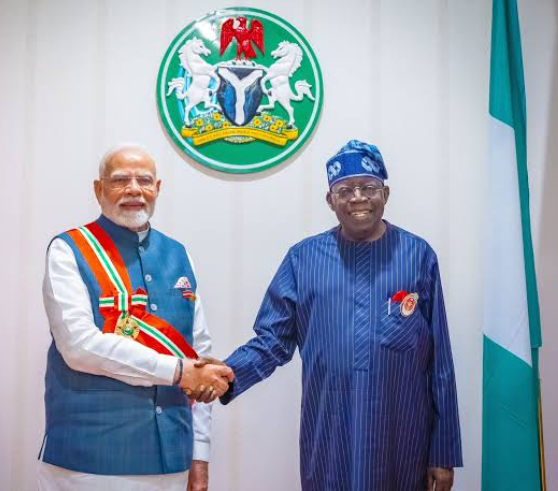
Modi’s Visit: What are the Potential Gains of the Nigeria-India Partnership?
By Zeenat Sambo
In a strategic move to attract investment from key global economies, Nigerian President Bola Ahmed Tinubu has described Indian Prime Minister Narendra Modi’s visit as a pivotal step toward reinforcing diplomatic trade ties, fostering foreign investment, and strengthening bilateral cooperation.
The recent meeting at the presidential villa in Abuja saw both leaders commit to closer collaboration on crucial issues such as maritime security, intelligence sharing, and counter-terrorism efforts. They also explored avenues for enhancing economic ties, defense cooperation, healthcare, and food security.
Economic Confidential reports that Modi’s visit was historic, marking the first trip by an Indian Prime Minister to Nigeria in 17 years.
Key Areas of Focus
During their discussions, President Tinubu and Prime Minister Modi reached agreements on several key issues expected to yield significant benefits across various sectors for both nations.
Security
The discussions underscored the importance of maritime security and the joint fight against piracy, with both leaders agreeing to enhance naval exercises in the Gulf of Guinea. This collaboration aims to transform the Gulf of Guinea into a safer region for shipping companies, thereby boosting international trade.
Reports from the State House suggest that this partnership could foster regional stability and create more economic opportunities for Nigerians. The commitment to increasing naval patrols and anti-piracy operations will secure maritime trade routes, reducing the risk of hijackings and kidnappings, ultimately stimulating economic activity in border countries.
While condemning terrorism, both leaders advocated for a robust response, calling for zero tolerance toward such acts and endorsing the Comprehensive Convention on International Terrorism within the UN framework. This concerted effort is expected to limit the cross-border movement of terrorists and their funding networks.
Enhanced security is anticipated to lead to lower insurance premiums for shipping companies, thereby generating additional revenue and attracting more international investments and trade.
Economic Benefits
As Nigeria repositions itself on the global trade spectrum, President Tinubu expressed optimism that the economic collaboration between Nigeria and India will generate substantial revenue through meaningful bilateral trade agreements.
India is already one of Nigeria’s largest trading partners, with over 200 Indian companies operating in the country, providing significant employment and investment opportunities. The two nations are expected to create an environment where more companies can thrive and expand, contributing to local economic development and increasing youth engagement.
In discussions on expanding bilateral trade, both leaders directed their officials to finalize outstanding agreements, including the Economic Cooperation Agreement (ECA), the Double Taxation Avoidance Agreement (DTAA), and the Bilateral Investment Treaty (BIT), all aimed at boosting trade and investment.
With the annual Nigeria-India bilateral trade exceeding USD 14 billion, India is poised to significantly increase its imports of crude oil, textiles, and other goods while exporting pharmaceuticals, engineering goods, automobiles, and agricultural machinery to Nigeria.
Agriculture
The focus on food security is critical for both Nigeria and India, given their substantial populations. Collaborative efforts will focus on providing agricultural machinery, high-yield seeds, and technical expertise to revive Nigeria’s agricultural sector.
Prime Minister Modi praised the Nigerian government for supporting the Indian resolution at the UN to declare 2023 the International Year of Millets. Both countries agreed to increase cooperation in millet production as part of their agricultural collaboration, aiming to enhance food security through joint ventures in ICT, technology transfer, and the modernization of Nigeria’s agriculture.
Health and Education
The two nations also prioritized establishing world-class healthcare and educational systems. They agreed to increase collaboration in building hospitals and diagnostic centers while utilizing innovative health management systems.
Acknowledging the contributions of Indian hospitals operating in Nigeria, both leaders recognized the need for advanced technologies to improve healthcare delivery, proposing the development of a comprehensive platform to enhance the health sector.
On education, India will continue offering scholarships and technical training programs under the Indian Technical and Economic Cooperation (ITEC) initiative, which will strengthen Nigeria’s human resource development and improve learning opportunities for students. Both leaders committed to supporting scholarship schemes designed to encourage Nigerian students to seize global opportunities.
Energy Security
The visit concluded with discussions on converting to compressed natural gas (CNG), supplying liquefied natural gas (LNG), and modernizing Nigeria’s defense systems.
As Africa’s largest oil producer, Nigeria plays a crucial role for India, a major energy consumer. The partnership promises a steady supply of crude oil and natural gas, bolstering India’s energy security.
At the G20 summit last year, Nigeria reported nearly $14 billion in pledges from Indian investors, including a commitment of $3 billion from Jindal Steel and Power to Nigeria’s steel sector.
India relies heavily on crude oil imports, making a strong partnership essential for ensuring a stable supply. Long-term contracts for LNG and natural gas will also diversify India’s energy sources and reduce dependency on single suppliers. India’s expertise in energy infrastructure, including pipeline transmission security and CNG conversion, will assist Nigeria in enhancing its energy distribution systems, promoting more efficient energy use and better energy security for both nations.
In conclusion, the synergy between Nigeria and India is poised to position both countries at the forefront of global trade and human investment. Nigeria’s economy stands ready to embrace foreign investments, particularly from India, and sharing India’s advancements in renewable energy technologies could pave the way for a more sustainable and secure energy future for Nigeria.
